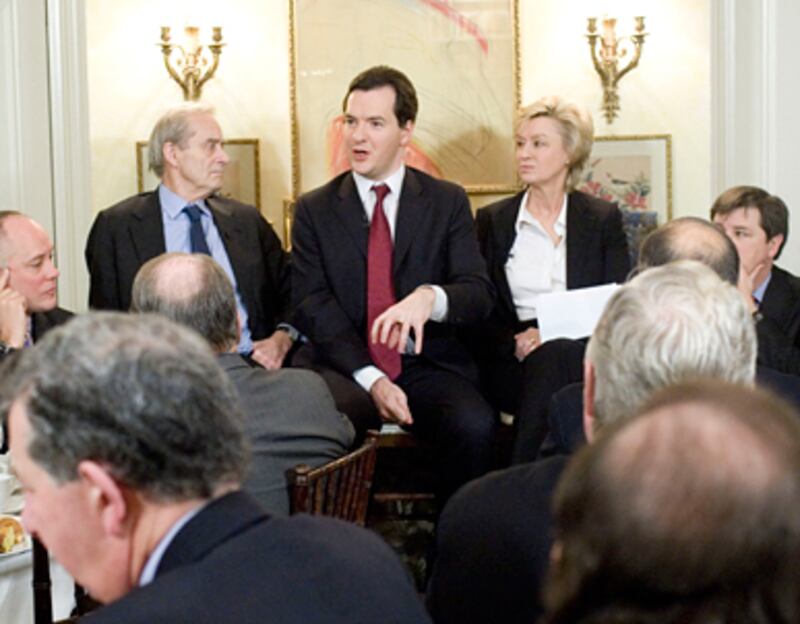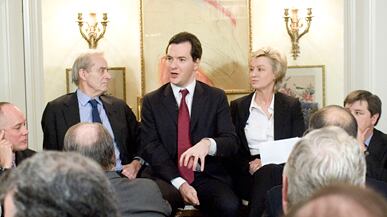George Osborne, Britain’s treasury head, has presided over tough austerity cuts but still enjoys popular support. At a breakfast co-hosted by Barclays and The Daily Beast, he talked about U.S. tax cuts and earning the people’s trust.
Nothing tends to make a politician more unpopular than raising taxes and cutting entitlements—especially at the same time. But more than six months after taking command of the British economy, George Osborne, 39, the U.K.’s Chancellor of the Exchequer, has begun to do just that. And remarkably, a large percentage of Brits continue to support his radically austere path. Indeed, over the past few months, Osborne has succeeded where his American counterpart—Timothy Geithner—has failed miserably: earning the public’s trust.

Osborne's success in doing so was on full display in New York on Friday morning, as he spoke to a small group of bankers, “hedgies,” economists, and journalists at a breakfast event that was sponsored by Barclays and The Daily Beast. As onlookers munched on quiche and croissants, the chancellor came across as an anti-Geithner of sorts: jovial, instead of dour, charming instead of wonky. Altogether, a smoothly urbane sort with whom one wouldn’t mind spending an evening over a bottle or two of claret. (The prospect of doing the same with Geithner doesn’t have quite the same appeal.)
“The British health-care system is the closest thing we have to a national religion,” Osborne jested, recycling an old line from a chancellor of yore, Nigel Lawson. Later, when asked whether the government should prevent banks from becoming too big to fail, the tall, Oxford-educated politician gave a piquant nod to the Barclays contingent in the audience. “I’m quite conscious of who this breakfast is sponsored by,” he said.
What followed, however, was a guarded response—as was, separately, his answer to whether he thought the tax-cut compromise in the U.S. Congress was good or bad—and with good reason: Osborne has been in New York this week, meeting with the heads of major investment houses, many of whom have lingering concerns about the outcome of British-style financial reform. His goal: to re-assure them that his government is not anti-bank. “We have a welcome mat for all financial services,” Osborne said. “We want Britain to be the pre-eminent financial hub.”
Yet in speaking on Friday, the chancellor also made sure to strike a rhetorical balance between promoting business-friendly policies with conveying a sense of empathy for the hardships that austerity may bring. “We are cutting the business tax rate… and specifically targeting multinationals, so they are taxed more leniently,” he said. “[But] I think the big challenge is: How do you convince the public that it’s fair? That’s where we have a lot of work to do.”
Unlike the U.S. government, the current British coalition has disavowed fiscal stimulus and instead pinned its hope on monetary policy, courtesy of the Bank of England. (At the New York meeting, however, he refused to take the bait from a questioner and pass judgment on the Fed’s quantitative easing.) In doing so, critics fear that Osborne’s plan will lead to a jobless recovery or even plunge the economy back into recession.
Those arguments gained greater currency this week, as the British unemployment rate rose to 7.9 percent. As it stands, 2.5 million people are unemployed in Britain, roughly the same amount as three months ago. In the meantime, the specter of inflation continues to loom large; prices remain above the Bank of England’s target rate, causing some to fear that reducing rates may not always been an option.
One critic, Nouriel Roubini, the bearish New York University economist known as Dr. Doom, was in attendance Friday morning. Dressed in a black suit, Roubini was seated diagonally across from Osborne at a table in the corner of the room. As Osborne spoke, Roubini sat and listened, intermittently nodding his head and crossing and uncrossing his arms across his chest.
“Reducing the budget deficit… that’s necessary” Roubini said later, to this reporter. “He’s making some hard choices for his country, whereas the U.S. is just kicking the can down the road." If the global economy falls back into recession, however, Roubini is worried that "there is no plan B."
That risk doesn’t appear to be a major concern for Osborne. Upon taking office, he and his very, very good friend, Prime Minister David Cameron (they are each others’ children’s godfathers), made quick use of their political capital, calling for more than $200 billion in cuts to the annual budget deficit over the next five years. “We felt it was important… to make use of our popular support,” Osborne said.
Osborne comes across as an anti-Geithner of sorts: jovial, instead of dour, charming instead of wonky.
Of course, keeping that support is another matter entirely. For all of Osborne’s charm and diplomacy, for all the salesmanship that he brings to the office, the British public has yet to actually feel the effects of austerity. Until they do, it's far too early to declare anything a success. But if and when success is declared, it will wear the hale face of George Osborne.
R.M. Schneiderman is a reporter for Newsweek.




